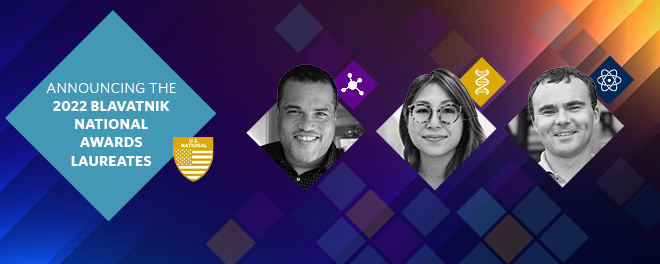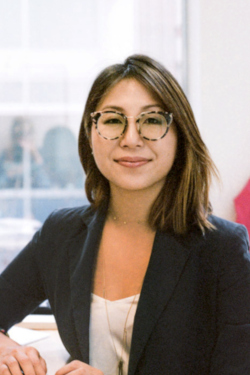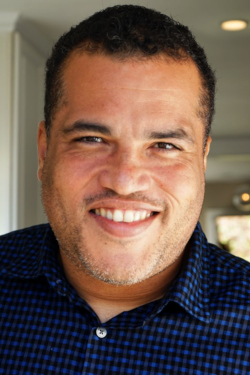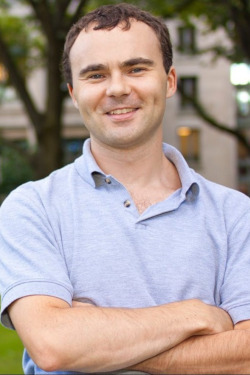Three national laureates–a neurobiologist from UCLA, a synthetic chemist from Caltech and a biomedical and mechanical engineer from Harvard–will each receive $250,000

NEW YORK, June 29, 2022 – The Blavatnik Family Foundation and the New York Academy of Sciences announced today a neurobiologist, a synthetic chemist and a mechanical engineer as the laureates of the 2022 Blavatnik National Awards for Young Scientists.
Each will receive $250,000, the largest unrestricted scientific award for America’s most innovative, young faculty-ranked scientists and engineers. The winners and their distinguished research:
- Elaine Y. Hsiao, Ph.D., a neurobiologist at the University of California, Los Angeles, for discoveries that expand the understanding of how the gut microbiome–the community of microorganisms that live in intestines–interacts with the nervous system. Her work could help improve maternal-fetal health and predict risk for neurodevelopmental disorders.
- Hosea M. Nelson, Ph.D., a synthetic chemist at the California Institute of Technology, for developing a technique that will help organic chemists design and synthesize new molecules. Nelson has pioneered microcrystal electron diffraction (MicroED) as a tool to determine the positions of atoms within small molecules with unprecedented detail. Resulting insights can help accelerate development of new drugs and commercial chemicals.
- Conor Walsh, Ph.D., a biomedical and mechanical engineer at Harvard University, for reshaping how humans can interact with machines through the development of a new class of lightweight, flexible and soft wearable robot technologies. This could dramatically improve mobility for disabled people, including people with ALS and those who have experienced a stroke.
“This award was created to inspire and encourage young, talented scientists to take risks and push the boundaries of science. We admire the laureates’ dedication and tenacity and look forward to many more future discoveries,” said Len Blavatnik, founder and chairman of Access Industries. He is head of the Blavatnik Family Foundation and a member of the President’s Council of the New York Academy of Sciences.
Nicholas B. Dirks, president and CEO of the New York Academy of Sciences, said, “This year’s laureates have each conducted research that will benefit human health. Major developments in science and medicine are usually the result of major investments in research. We thank the Blavatnik Family Foundation for its generous philanthropic support of early-career scientists with this prestigious award.”
The 2022 Blavatnik National Awards competition received 309 nominees from 150 research institutions across 38 states. Laureates must be faculty-level scientific researchers, 42 years of age or younger.
Three independent juries–one each for life sciences, chemistry and physical sciences and engineering–were composed of some of America’s most distinguished scientists.
The juries selected the winners from a group of 31 finalists named earlier this month. More details on the laureates’ research can be found here for Hsiao, Nelson and Walsh.
The Blavatnik National Awards for Young Scientists will celebrate the 2022 laureates and finalists in a ceremony on Sept. 19 at the American Museum of Natural History in New York.
2022 Blavatnik National Awards Laureate in Life Sciences

Elaine Y. Hsiao, Ph.D.
Associate Professor
De Logi Chair of Biological Sciences
University of California, Los Angeles
Elaine Y. Hsiao, Ph.D., is making unprecedented discoveries on the gut-brain connection by investigating the gut microbiome and the biomolecules they produce – also known as metabolites. Hsiao is advancing our understanding of how bacterial metabolites influence neurodevelopment, neurological diseases and gastrointestinal disorders. Research on gut microbiome-brain interactions often just look at correlations between bacterial species and various disorders. Hsiao, however, identifies specific types of bacteria and their mechanisms of action for directly impacting brain function. Hsiao’s laboratory made the remarkable discovery that the metabolites produced by the microbiome of pregnant women can influence fetal neurodevelopment and have lasting impact on the adult behavior of their offspring. This discovery could lead to improved maternal-fetal health and assessments of risk for neurodevelopmental disorders. Hsiao’s laboratory also found that select gut bacteria can regulate levels of the neurotransmitter serotonin and interact directly with serotonin and common anti-depressants such as selective serotonin reuptake inhibitors (SSRIs). This means that by interacting with the serotonin system, the gut microbiome could influence the effects of antidepressant drugs on health and disease.
"Dr. Elaine Hsiao was selected for her major discoveries that elucidate our understanding of the complex interactions that happen between both helpful and problematic microbes in our gut and the rest of our body, including our brain. The Life Sciences Jury recognized her pioneering and interdisciplinary research themes that connect the immune system to behavioral neuroscience and brain development. These discoveries include new understanding of how our gut microbes influence our mood and behavior, why the ketogenetic diet works to control seizure disorders and how gut metabolites transfer from mother to fetus. The Life Sciences Jury selected her from a very accomplished and impressive field of finalists."
Sapp Family Provostial Professor
The Catherine Holman Johnson Director of Stanford Bio-X and Professor of Biology and of Neurobiology, Stanford University
2022 Blavatnik Awards Jury Member
2022 Blavatnik National Awards Laureate in Chemistry

Hosea M. Nelson, Ph.D.
Professor of Chemistry
California Institute of Technology
Hosea M. Nelson, Ph.D., is fearlessly pursuing new methods to understand the molecules that make up every part of our daily lives. The methods being developed in his lab are creating new types of molecules that will ultimately lead to key advances in human health and sustainable technologies. The two pillars in Nelson’s research lab are measurement of molecules with atomic precision and environmentally-friendly and inexpensive methods for molecular synthesis. Toward the pillar of precise measurement of molecules, Nelson has adapted cryogenic electron microscopy–a technology typically used to identify the arrangement of atoms in large biological molecules like proteins–to measure much smaller molecules. This powerful, new technique is called microcrystal electron diffraction (or MicroED) and gives previously unforeseen insight into small molecules, building a foundation to dramatically accelerate the development of new drugs or commercial chemicals.
"Hosea Nelson was the 2022 Chemistry Jury’s unanimous choice. What really brought him to the top of our selection was his discovery of microcrystal electron diffraction. This technology existed for biological molecules, but Hosea applied it to small molecule chemistry, and now it is having implications in many areas of chemistry. In addition to this flagship discovery, his research program has incredible breadth and creativity, spanning development of novel strategies for the C–H functionalization of hydrocarbons to the development of an amplification strategy that has been used to detect small quantities of SARS-CoV-2 genes. His personal journey to become a prominent chemist is inspirational. He did not complete high school and eventually went back to community college to earn his GED. He then pursued his bachelor’s degree at UC Berkeley and earned his Ph.D. at Caltech, where he is now a faculty member. In addition to his research, Hosea spends a lot of his time doing outreach activities promoting diversity, equity and inclusion. Thus, he's having an impact in so many different ways as both a role model and as a scientist. Overall, Hosea is just spectacular."
Sterling Professor of Chemistry, Yale University
2022 Blavatnik Awards Jury Chair
2022 Blavatnik National Awards Laureate in Physical Sciences and Engineering

Conor Walsh, Ph.D.
Paul A. Maeder Professor of Engineering and Applied Sciences
Associate Faculty Member, Wyss Institute for Biologically Inspired Engineering
Harvard University
Adjunct Associate Professor, Department of Physical Therapy at the College of Health and Rehabilitation Sciences: Sargent College
Boston University
Research Faculty Member
Spaulding Rehabilitation Hospital Stroke Research and Recovery Institute
Biomedical and mechanical engineer Conor Walsh, Ph.D., is reshaping our understanding of how humans interact with machines. His research group has pioneered a whole new class of lightweight, flexible and soft wearable robot technologies and has helped launch this new and rapidly expanding field of soft wearable robotics. His research combines aspects of human movement science (e.g., biomechanics and physical therapy) with sophisticated solutions in robot device design to improve the quality of life, mobility and quality of care for people with physical disabilities. His technological innovations are wide-ranging, from functional apparel (textiles materials), to elegant designs for electro-mechanical systems and sensors to software control algorithms. Each technological innovation from his lab has had a tremendous impact on the field.
"Conor Walsh combines all four Blavatnik Awards qualities: the Quality, Impact, Novelty and Promise of his science, all rolled into a single technological field in which he is a true pioneer–soft wearable robotics. His robotics technologies promise to dramatically improve mobility for disabled people, such as people with ALS or who have experienced a stroke. Walsh’s research takes its inspiration from the functionality of human movement to achieve elegant solutions. His group has also taken this technology to the marketplace, and we expect this will revolutionize the ability of disabled people to safely recover some of their mobility, as well as their quality of life. Imagine a lower limb that gives a person extra energy to raise the leg at the knee joint. That person may now be able to walk upstairs–a significant impact on their quality of life."
Distinguished Professor, Texas A&M University
2022 Blavatnik Awards Jury Chair
About the Blavatnik National Awards for Young Scientists
The Blavatnik National Awards for Young Scientists, established by the Blavatnik Family Foundation in 2007 and independently administered by the New York Academy of Sciences, began by identifying outstanding regional scientific talent in New York, New Jersey and Connecticut. The Blavatnik National Awards were first awarded in 2014 and expanded in 2017 to honor faculty-rank scientists in the UK and Israel. By the end of 2022, the Blavatnik Awards will have awarded prizes totaling $13.6 million. Visit blavatnikawards.org for further information.
About the Blavatnik Family Foundation
The Blavatnik Family Foundation is an active supporter of world-renowned educational, scientific, cultural and charitable institutions in the United States, the United Kingdom, Israel and other countries. The foundation is headed by Len Blavatnik, a businessman, philanthropist and founder and chairman of Access Industries, a privately held industrial group based in the U.S. with global strategic interests. Visit www.accessindustries.com or www.blavatnikfoundation.org for more information.
About the New York Academy of Sciences
The New York Academy of Sciences is an independent, not-for-profit organization that has been committed to advancing science for the benefit of society since 1817. With more than 20,000 members in 100 countries, the Academy advances scientific and technical knowledge, addresses global challenges with science-based solutions and sponsors a wide variety of educational initiatives at all levels for STEM and STEM-related fields. The Academy hosts programs and publishes content in the life and physical sciences, the social sciences, nutrition, artificial intelligence, computer science and sustainability. The Academy also provides professional and educational resources for researchers across all phases of their careers. Please visit us online at www.nyas.org.
Media contact
Kamala Murthy
kmurthy@nyas.org
212-298-3740
###